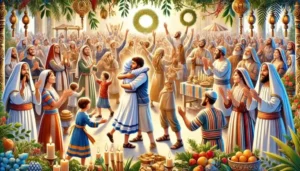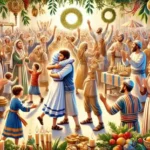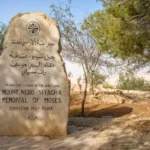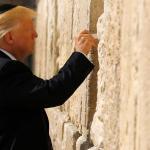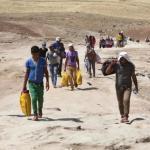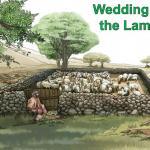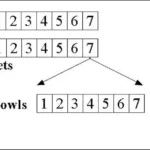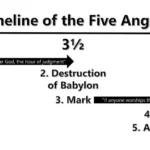Last Updated on December 9, 2024 by Steve
Theories about the 144,000 Israelites
There are many theories as to the purpose of the 144,000 sealed Israelites of Revelation chapter 7 and what they will do during the tribulation period, and also the significance of the number 144,000. Some say it is a symbolic number and others the actual number. Commentators say such things as they are 144,000 radical disciples who follow the Lamb wherever He goes representing the most consecrated and faithful of God’s people of all time who evangelise the world for Christ during the tribulation period. One of the reasons could be that they are sealed meaning they are saved and protected from the harms of demonic attacks.1 The Bible indicates that the 144,000 sealed servants of God are active from the start of Daniel’s 70th week but the really intriguing thing is that the order of their listed names seems to be unusual—it is not in the natural birth order.
It should be made clear is that there are two passages in Revelation about 144,000 men. There are the 144,000 men of Israel in Rev. 7:1–8 and the singers described in Rev. 14:1–5. The 144,000 of chapter 7 are sealed at the beginning of the 70th week whereas John sees the 144,000 singers standing on Mt. Zion with the Lamb (Jesus) at the end of the 70th week and beginning of the new Messianic kingdom on earth. I believe that the 144,000 men of chapters 7 and 14 are talking about the same group of people. In this article I am examining the 144,000 Israelites of chapter 7. See the article, “144,000 singers of Revelation 14” to read about the other reference to the 144,000.
Now, I don’t know what you make of all this but it does seem to be a mystery. Something I want you to consider is that there could be a secret message in the names of the tribes related to the order in which they are listed in Revelation chapter 7. You’ll notice in the list of the tribes that there are a few discrepancies such as the tribe of Dan not being mentioned and the half tribe of Ephraim isn’t mentioned either. Also, the order seems to be very random in Revelation and different from the birth order in which Jacob gives his blessing as well in Gen. 49:1–27. The thing to realise is that nothing in the Bible is random. Everything has a meaning and a purpose. What is God saying to us?
There are many questions and I believe we can answer those questions and give a possible meaning to this but both Genesis and Revelation need to be examined in combination to get the full meaning.
The first thing that we notice is that the order in Rev. 7 is not the birth order in Gen. 49. When the names of the tribes are read in the supposed random order and their meanings are read out we see that the meanings tell a story, an incredible prophetic and meta-narrative story (a bigger story) of what will happen at the end of our age.
Precedence in Scripture
But did you know that this isn’t the only place in the Bible where a list of names tells a meta-narrative story? It’s also in the book of Genesis. The first ten names in Genesis 5 tell a similar prophetic story. If you take the meanings of the first ten names in the genealogy from Adam to Noah you get a fairly well-known story that you may have heard of before. The prophetic statement reads like this:
“Man2 / was appointed3 / mortal4 / sorrow5 / but the blessed God6 / shall come down7 / teaching.8 / His death shall bring9 / the despairing10 /rest.”11
This of course tells the whole plan of God that because of man’s sin and death, Jesus (Son of Yahweh) came down upon this earth teaching, and His death brought about rest for despairing man. This is a compact form of the basic story of the Bible—His Story.
But incredibly the ‘random’ names of the tribes of Israel listed in Rev. 7:5–8 similarly reveal a prophetic statement.
Random order of the tribes of the 144,000
Random in the Bible should arouse our suspicion because in reality, it’s probably just something that we are missing and haven’t understood yet. So let’s start by giving the statement upfront from the order given and then I will go through and show how the meanings are derived: “I will praise the Lord12 because the Lord has seen13 my misery and a troop14 is coming. I am happy because the daughters will call me blessed.15 I have had a great struggle16 but God has caused me to forget17 all my troubles. The Lord has heard18 that I am not loved, now at last my husband will become attached19 to me. God has rewarded20 me, God has presented me with a precious gift.21 And God will add22 to me His son, the son of (His) right hand.”23
Okay, so how do we come up with the meaning of the names? That’s where Genesis comes into play and that’s the purpose of the Foundation series because we need both the beginning and the end of the Bible to get the full meaning. So you will notice that as each son is born, either Jacob or one of his wives and Joseph in the case of Manasseh each make a prophecy, and included is a wordplay or pun about each son. When these word plays are all put together in the order of Rev. 7 you get an amazing message from the perspective of a woman which is prophetic.

Message is from the perspective of a future bride speaking
God waited until the very last book of the Bible to give us a story derived from the meanings of the names of the twelve tribes.
So what does it all mean? Do you get the notion that the story is from the perspective of a woman, of a bride who is about to be wed? Sure! I believe the order of the names of the 144,000 sealed Israelites contains an important secret message to the Woman of Revelation 12. The 144,000 themselves do not go into the safe place because they have a mission for seven years and furthermore they are already safe in that they are sealed with the Father’s name and the Lamb’s name.24 The woman however takes refuge during the final 3 ½ years of the seven-year tribulation after listening and heeding the secret message of the 144,000. She then weds her husband in the privacy of the chuppah, the safe place which is Bozrah. We know the timing of the wedding because of Rev. 19:1-10 which says it occurs immediately proceeding after the destruction of Babylon. See the article The Wedding of the Lamb in Bozrah for the timing of the wedding.
The bigger story for the woman of Revelation 12 who is waiting for her bridegroom is that she will praise the Lord because He (God) has seen her suffering, affliction, and misery. Jesus and his army of angels are coming (a troop) so there is nothing for her to worry about or concern herself with. Others will see the woman being protected in the wilderness and will call her blessed. She has had a great struggle and suffered persecution in the first half of the tribulation but God causes her to forget her misery because now she is protected in the safe place waiting to meet her spouse. The woman was not loved by the world but hated because she followed Jesus and she persevered. But now at last God will reward her because her husband, Jesus, is coming and he will become attached to her in marriage very soon. She will be presented faultless before the presence of His glory with exceeding joy and blameless at the wedding supper of the Lamb.
The final three names in the list in Rev. 7:8 reinforces the reward message that has just been told to the woman. Not only has she received the precious gift of salvation but she has received Jesus, who sits at God’s right hand and He will finally be her husband.
Why did Jacob change Ben-Oni’s name to Benjamin?
Have you ever noticed that Benjamin’s name was changed from ‘Ben-Oni’ to ‘Benjamin’?25 The meanings change from ‘son of my sorrows’ to ‘son of my right hand’. Rachel did not make a mistake by initially naming her baby boy Ben-Oni but there was a deliberate and prophetic change and that is because it follows the change in Jesus’ status. Jesus originally was the man acquainted with sorrows26 on the cross (Ben-Oni) but then upon conquering death after the cross, he sat down at the right hand of the Father and so metaphorically became Benjamin.
Can you see the amazing and perfect symmetry to this meta-narrative message which includes Jesus initially being a man of sorrows to having victory on the cross and subsequently sitting at the right hand of the Father in Heaven? It is to this victorious man that the bride of Christ will be married.
What about the two missing tribes Dan and Ephraim?
But what about the two names that were missing in the list of the twelve tribes, Dan and Ephraim? They too have a meaning that adds to the bigger story! Dan27 means ‘God has judged me’ and Ephraim28 means ‘God has made me fruitful in the land of my suffering’.
When we put these two together into a meaningful statement we get… ‘God has judged (Dan) me and He has made me fruitful (Ephraim) in the land of my suffering.’
In other words, those Christians who do not escape to the wilderness at the midpoint of the seven-year tribulation will have to endure the last three severe trumpet judgments of God (woe, woe, woe) during the last 3 ½ years on the earth. The good news for them is that they will be saved at the end of that period by rejecting the mark of the beast. God judges them unworthy of protection because they did not listen to the warning signs just like the five foolish virgins. However they will eventually be fruitful albeit in the land of suffering. It will take great courage and patience to be fruitful in that awful context. It will mean refusing the mark of the beast.
So, even the names not found in the list of chapter 7 fit perfectly with what is about to occur.
Conclusion
Hopefully, you can clearly see that this bigger prophetic story tells us about the return of Jesus with His army the troop of angels, the precious gift of salvation, and the wedding of the Lamb, Jesus, being attached to His bride. The 144,000 servants of God are called out of a larger group of believers at the beginning of the tribulation but they will have to be from one of the twelve tribes listed in vv. 5–8. They will encourage the church (the ten virgins) during the first half to heed the warning, to wake up and become ready with oil in their lamps, to be ready to flee to the wilderness when the time comes at the halfway mark. But what will happen? All virgins are drowsy29 but five of them were wise by already becoming ready. See the post “Parable of the ten virgins” for a comprehensive look at the ten virgins.
It is a story encouraging believers to keep waiting, it won’t be long. Hold on and don’t give up. The 144,000 encourage believers to escape and then after the halfway point their message takes a different tack. They will then preach the gospel with a bent on refusing the mark and persevering unto death which involves martyrdom. If they persevere until the end then they will receive an invitation to the wedding banquet in the Millennial Kingdom.
See the post, “What will the 144,000 do for seven years?” for more of an extensive look at what these 144,000 servants of God will do during the tribulation.
So what are we to do in the light of all this information?
Trust in the Lord and pray that you might have the strength and fortitude to escape30 and be included in the bride, not those who are excluded exemplified by the message of Dan and Ephraim. This will be a much harder road to take even though those who take this course and endure to the end will be fruitful.
- Rev. 9:4 [↩]
- Adam [↩]
- Seth [↩]
- Enosh [↩]
- Kenan [↩]
- Mahalalel [↩]
- Jared [↩]
- Enoch [↩]
- Methuselah [↩]
- Lamech [↩]
- Noah [↩]
- Judah—Gen. 29:35 [↩]
- Reuben—Gen. 29:32 [↩]
- Gad—Gen. 30:11 YLT [↩]
- Asher-Gen. 30:13 [↩]
- Naphtali—Gen. 30:8 [↩]
- Manasseh—Gen. 41:51 [↩]
- Simeon—Gen. 29:33 [↩]
- Levi—Gen. 29:34 [↩]
- Issachar—Gen. 30:18 [↩]
- Zebulun—Gen. 30:20 [↩]
- Joseph—Gen. 30:24 [↩]
- Benjamin—Gen. 35:18 [↩]
- Rev. 14:1 [↩]
- Gen. 35:18 [↩]
- Isa. 53:3 ESV [↩]
- Gen. 30:6 [↩]
- Gen. 41:52 [↩]
- Matt. 25:5 [↩]
- Luke 21:36 [↩]




